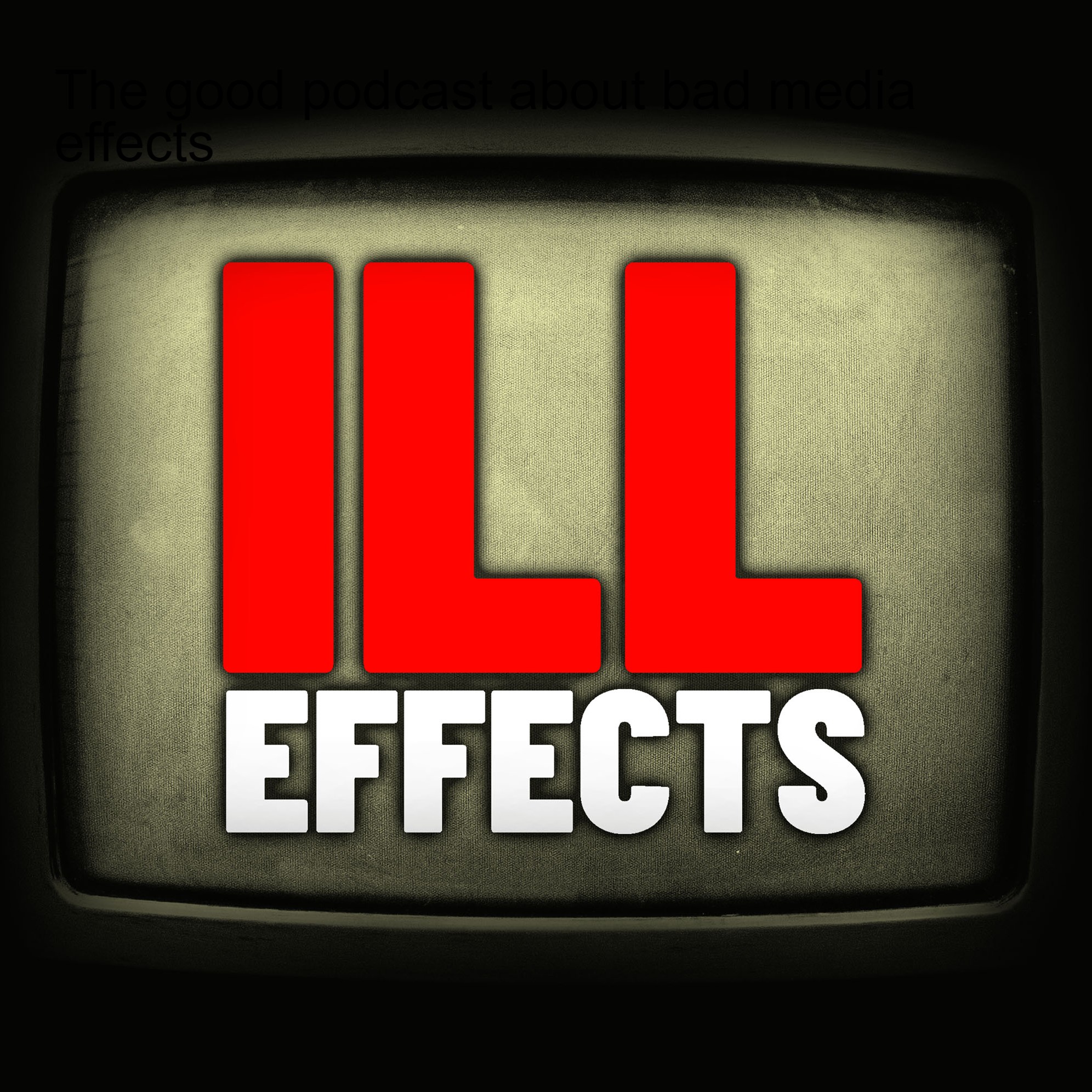Episodes
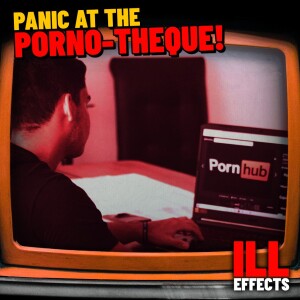
2 hours ago
Panic at the Porno-theque!
2 hours ago
2 hours ago
This week, Rich fires up the dial-up and drags Ben back to the '90s, when computer porn was “technology’s HIV” and the moral panic went full throttle. It’s ILL EFFECTS bingo: lurid headlines, laughable research, ominous documentary music, and a truly cursed TIME magazine cover of a man trying to get jiggy with his computer monitor.
Credits:
Hosts – Rich McCulloch and Ben Litherland
Music by - Brutalust (Colin Frank and Maria Sappho), recorded and mixed by Joe Christman
Producer – Caroline Pringle
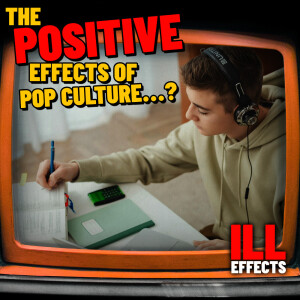
Thursday Jun 05, 2025
The positive effects of pop culture…?
Thursday Jun 05, 2025
Thursday Jun 05, 2025
Can television make you kinder? Can video games make you smarter? Can porn improve your maths skills? Wait, what? In this episode, Ben walks Rich through a curious set of popular claims circulating in online blogs: that pop culture might be having positive effects. But what’s the evidence behind these claims? And what does their popularity reveal about how we understand news, science, and ultimately our own anxieties about work and leisure?
Show Notes:
Litherland, B. (2025). Smarter, better, faster, kinder? The problems with claiming that media and popular culture has positive effects. International Journal of Cultural Studies, 13678779251337761.
Note: Journal articles are often behind paywalls. If you don't have institutional access but would like a copy of these papers please email Illeffectspod@gmail.com and we will happily send you a copy
Credits:
Hosts – Rich McCulloch and Ben Litherland
Music by - Brutalust (Colin Frank and Maria Sappho), recorded and mixed by Joe Christman
Producer – Caroline Pringle

Thursday May 22, 2025
The Hot Ones Episode!
Thursday May 22, 2025
Thursday May 22, 2025
Ill effects does Hot Ones! Ben and Rich talk about using hot sauce as a measure of aggression in lab-based experiments when studying the relationship between media and violence. They do this while unwisely eating increasingly hot hot sauces. Where did this research come from, why are their mouths burning? All this and more. “Hey, look at us. Who would have thought? Not me!”
Show Notes:
Krahé, B. (2014). Restoring the spirit of fair play in the debate about violent video games. European Psychologist.
Lieberman, J. D., Solomon, S., Greenberg, J., & McGregor, H. A. (1999). A hot new way to measure aggression: Hot sauce allocation. Aggressive Behavior: Official Journal of the International Society for Research on Aggression, 25(5), 331-348.
Markey, P. M., Markey, C. N., & French, J. E. (2015). Violent video games and real-world violence: Rhetoric versus data. Psychology of Popular Media Culture, 4(4), 277.
McCarthy, R. J., & Elson, M. (2018). A conceptual review of lab-based aggression paradigms. Collabra: Psychology, 4(1).
Plante, C., Anderson, C. A., Allen, J. J., Groves, C. L., & Gentile, D. A. (2020). Game On!: Sensible Answers about Video Games and Media Violence. Zengen LLC.
Ritter, D., & Eslea, M. (2005). Hot sauce, toy guns, and graffiti: A critical account of current laboratory aggression paradigms. Aggressive Behavior: Official Journal of the International Society for Research on Aggression, 31(5), 407-419.
Tedeschi, J. T., & Quigley, B. M. (1996). Limitations of laboratory paradigms for studying aggression. Aggression and Violent Behavior, 1(2), 163-177.
Note: Journal articles are often behind paywalls. If you don't have institutional access but would like a copy of these papers please email Illeffectspod@gmail.com and we will happily send you a copy
Credits:
Hosts – Rich McCulloch and Ben Litherland
Title Music by - Brutalust (Colin Frank and Maria Sappho), recorded and mixed by Joe Christman
Producer – Caroline Pringle
Dramatic Music by Dmitry Taras from Pixabay – dramatic
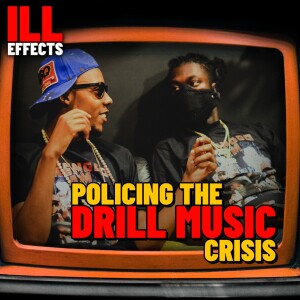
Thursday May 08, 2025
Policing the Drill Music Crisis
Thursday May 08, 2025
Thursday May 08, 2025
Knife crime, hip hop, and... Vanessa Carlton?!? In 2018, drill music became known as the soundtrack to social collapse—accused of inciting violence, corrupting youth, and starting gang wars via YouTube beef. But Rich shows Ben that behind the panic lies a familiar story: bad data, racial scapegoating, and a government more comfortable censoring rap than tackling inequality. Hang on until the end for a bizarre cameo from a very confused young offenders’ playlist.
Credits:
Hosts – Rich McCulloch and Ben Litherland
Music by - Brutalust (Colin Frank and Maria Sappho), recorded and mixed by Joe Christman
Producer – Caroline Pringle
Cover image: “Skengdo & AM backstage at Greener on the Other Side EP Launch, Ace Hotel, Shoreditch” (2018) https://commons.wikimedia.org/wiki/File:Skengdo_x_AM.jpg
Air Horn: Sound Effect by Waitwhatimsignedin from Pixabay
Air Horn 2: Sound Effect by SonixFXSounds from Pixabay
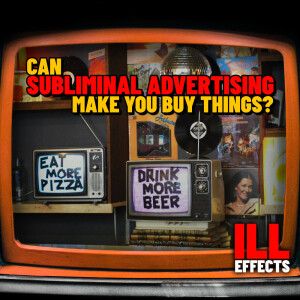
Thursday Apr 24, 2025
Can subliminal advertising make you buy things?
Thursday Apr 24, 2025
Thursday Apr 24, 2025
[Eat popcorn!] In 1957, market researcher James Vicary promised he could flash split-second commands on movie screens and subconsciously influence audiences to buy things. He called it subliminal advertising. [Drink Coca-Cola!] Ben drags Rich through the riotous history of hidden persuasion, packed with hucksters, gimmicks, and shrinks. But as silly as these experiments were, what do they reveal about our relationships to advertising today? [Consume!]
Show Notes:
Acland, C. R. (2011). Swift viewing The popular life of subliminal influence. Duke University Press.
Crandall, K. B. (2006). Invisible commercials and hidden persuaders: James M. Vicary and the subliminal advertising controversy of 1957. Undergraduate Honors Thesis. University of Florida. Available at http://plaza. ufl. edu/cyllek/docs/KCrandall_Thesis2006. pdf.
Fullerton, Ronald A. "The Devil's Lure?: Motivation Research, 1934-1954." In Proceedings of the Conference on Historical Analysis and Research in Marketing, vol. 12, pp. 134-143. 2005.
Heffernan, K. (2002). The hypnosis horror films of the 1950s: Genre texts and industrial context. Journal of Film and Video, 54(2/3), 56-70.
Horowitz, D. (1994). Vance Packard & American Social Criticism. Univ of North Carolina Press.
Key, W. B. (1973). Subliminal seduction: Ad media’s manipulation of a not so innocent America. Englewood Cliffs, NJ: Prentice-Hall.
Mackay, J., & Anonymous. (2023). Hypnosis and pornography: a cultural history. Porn Studies, 10(1), 82-98.
Parkin, K. (2004). The sex of food and Ernest Dichter: the illusion of inevitability. Advertising & Society Review, 5(2).
Samuel, L. R. (2010). Freud on Madison Avenue: motivation research and subliminal advertising in America. University of Pennsylvania Press.
[Video] Aldous Huxley interviewed by Mike Wallace
[Video] Daniels, Harold (1958) My World Dies Screaming
Note: Journal articles are often behind paywalls. If you don't have institutional access but would like a copy of these papers please email Illeffectspod@gmail.com and we will happily send you a copy
Credits:
Hosts – Rich McCulloch and Ben Litherland
Music by - Brutalust (Colin Frank and Maria Sappho), recorded and mixed by Joe Christman
Producer – Caroline Pringle
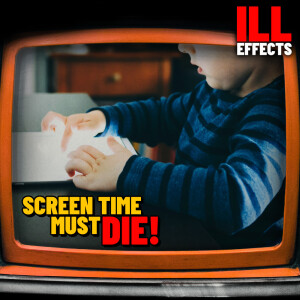
Thursday Apr 17, 2025
“Screen Time” Must Die!
Thursday Apr 17, 2025
Thursday Apr 17, 2025
Depression. Anxiety. Sleep deprivation. Addiction. The headlines about "screen time" and today’s kids sound like the end of the world. But in the Season 2 opener of ILL EFFECTS, Rich walks Ben through the panic—and the patchy science propping it up. He argues it’s time to ditch the outdated idea of screen time altogether, and to replace it with a smarter, more nuanced conversation about how, when, and why we use modern media.
NOTE: The initial version of this episode (published 10th April 2025) had some sound issues, a new version was published 17th April 2025.
Credits:
Hosts – Rich McCulloch and Ben Litherland
Music by - Brutalust (Colin Frank and Maria Sappho), recorded and mixed by Joe Christman
Producer – Caroline Pringle
Sound Effect by Devrinta Rose Nataya from Pixabay
Sound Effect by Rasool Asaad from Pixabay
Cover art photo by Kelly Sikkema on Unsplash
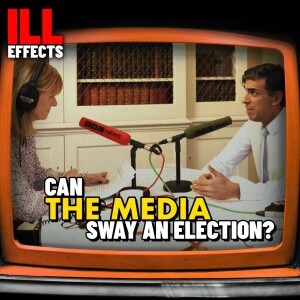
Tuesday Jul 02, 2024
Can the media sway an election?
Tuesday Jul 02, 2024
Tuesday Jul 02, 2024
In this bumper Very Special Episode ahead of this week’s UK General Election, we take it in turns to examine whether “the media” can “sway” election results. First, Ben examines the always-silly and sometimes-sinister British tabloid press and their (in)famous claim that it was “The Sun Wot Won It” for John Major in 1992. Rich then looks at Cambridge Analytica, and the claims that its Facebook quizzes helped make Brexit happen. Politics podcasts deserve better: vote for ILL EFFECTS!
WE NEED YOU: Click HERE to complete our listener survey and help shape future episodes!
Show Notes:
SOURCES AND LINKS:
Afriat, H., et al. (2021) “This is capitalism. It is not illegal”: Users’ attitudes toward institutional privacy following the Cambridge Analytica scandal. The Information Society, 37(2).
BBC (2018) “Cambridge Analytica: The data firm's global influence,” BBC News, 22nd March.
BBC (2020) “Cambridge Analytica 'not involved' in Brexit referendum, says watchdog,” BBC News, 7th October.
Berghel, H. (2018) “Malice Domestic: The Cambridge Analytica Dystopia,” Computer, 51(5), May.
Bruns, A. (2019) Are Filter Bubbles Real? Polity Press.
Cadwalladr, C., and Graham-Harrison, E. (2018) “Revealed: 50 million Facebook profiles harvested for Cambridge Analytica in major data breach,” The Guardian, 17th March.
Curtice, J. "Was it The Sun wot won it again? The influence of newspapers in the 1997 election campaign." Centre for research into elections and social trends working papers 75 (1999).
De Vany, A. (2004) Hollywood Economics: How extreme uncertainty shapes the film industry. Routledge.
Druckman, J. N. (2005). Media matter: How newspapers and television news cover campaigns and influence voters. Political communication, 22(4), 463-481.
Fuchs, C. (2013) Social Media: A Critical Introduction. Sage.
Gunther, A. C., Perloff, R. M., & Tsfati, Y. (2008). Public opinion and the third-person effect. The SAGE handbook of public opinion research, 184-191.
Heawood, J. (2018) “Pseudo-public political speech: Democratic implications of the Cambridge Analytica scandal,” Information Polity, 23.
Hern, A. (2018) "Cambridge Analytica: how did it turn clicks into votes?” The Guardian, 6th May.
Linton, M. (1996). Maybe The Sun won it after all. British Journalism Review, 7(2), 20-26.
Parliament.UK (2018) “The issue of data targeting, based around the Facebook, GSR and Cambridge Analytica allegations.” Disinformation and ‘fake news’: Interim Report. 29th July.
Price, V., & Feldman, L. (2009). News and politics. The Sage Handbook of Media Processes and Effects. Los Angeles: Sage Publications, 113-129.
Rathi, R. (2019) “Effect of Cambridge Analytica’s Facebook ads on the 2016 US Presidential Election,” Towards Data Science, 13th January.
Reeves, A., McKee, M., & Stuckler, D. (2016). ‘It's The Sun Wot Won It’: Evidence of media influence on political attitudes and voting from a UK quasi-natural experiment. Social science research, 56, 44-57.
Risso, L. (2018) ‘Harvesting Your Soul? Cambridge Analytica and Brexit’ in Jansohn, C. (ed.) Brexit Means Brexit? The Selected Proceedings of the Symposium, Akademie der Wissenschaften und der Literatur -- Mainz 6–8 December 2017. Akademie der Wissenschaften und der Literatur, Mainz.
Strömbäck, J. (2011). Mediatization and perceptions of the media's political influence. Journalism studies, 12(4), 423-439.
Thomas, J. (2007). Popular newspapers, the Labour Party and British politics. Routledge.
Wong, J. C., et al. (2018) “How academic at centre of Facebook scandal tried – and failed – to spin personal data into gold,” The Guardian, 24th April.
Note: Journal articles are often behind paywalls. If you don't have institutional access but would like a copy of these papers please email Illeffectspod@gmail.com and we will happily send you a copy
Episode artwork photo by Simon Dawson / No 10 Downing Street. Used under Creative Commons license (ATTRIBUTION-NONCOMMERCIAL-NODERIVS 2.0 GENERIC).
Credits:
Hosts – Rich McCulloch and Ben Litherland
Music by - Brutalust (Colin Frank and Maria Sappho), recorded and mixed by Joe Christman
Creative producer – Rachel Wood
Technical producer – Caroline Pringle
Technical production – Colin Frank
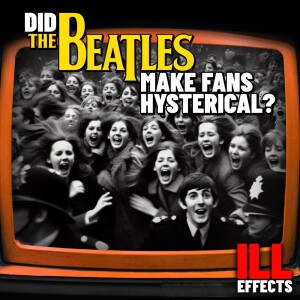
Thursday Jun 20, 2024
Did The Beatles make fans hysterical?
Thursday Jun 20, 2024
Thursday Jun 20, 2024
In the 1960s, parents, the press, psychologists, and many others were confronted with a large, terrifying, global problem: Beatlemania. In this episode, Ben talks Rich through how the world tried to make sense of the screaming, potentially hysterical, pop fan. We encounter theories of red goddesses (what were shrinks taking in the 60s?), anti-communist creeds, and Adrienne from Brooklyn that really, really loves Paul.
Show Notes
Sources and Links
[Video] A taste of Beatlemania in the 1960s
[Video] CBS News reports on the Beatles in 1964
“What the Beatles Prove About Teen-agers” (1962) U.S. News & World. 24 February.
Berman, G. (2007). "We're Going to See the Beatles!": An Oral History of Beatlemania as Told by the Fans who Were There. Santa Monica Press.
Davies, E. (1969). Psychological characteristics of Beatle mania. Journal of the History of Ideas, 30(2), 273-280.
Dempsey, D. (1964). Why the Girls Scream, Weep, Flip. The path to understanding is psychological, anthropological and a whole lot besides. New York Times Magazine, 23.
Ehrenreich, B., Hess, E., & Jacobs, G. (1992). “Beatlemania: Girls just want to have fun” In Lisa A. Lewis (ed) The Adoring Audience Routledge.
Leonard, C. (2016). Beatleness: How the Beatles and their fans remade the world. Skyhorse.
Millard, A. (2012). Beatlemania: Technology, Business, and Teen Culture in Cold War America. JHU Press.
Mills, R. (2019). The Beatles and Fandom: Sex, Death and Progressive Nostalgia. Bloomsbury Publishing USA.
Taylor, A. J. W. (1966). “Beatlemania—A study in adolescent enthusiasm”. British Journal of Social and Clinical Psychology, 5(2), 81-88.
Taylor, A. J. W. (2014). “The 1964 Wellington Study of Beatlemania Revisited”, Psychology, 5(15), 1844.
Van Luling, T. (2017) “11 Things You Probably Didn't Know About The Beatles, Even If You're A Superfan”, Huffington Post. 7 December.
Womack, K., & O'Toole, K. (Eds.). (2021). Fandom and the Beatles: The Act You've Known for All These Years. Oxford University Press, USA.
Note: Journal articles are often behind paywalls. If you don't have institutional access but would like a copy of these papers please email Illeffectspod@gmail.com and we will happily send you a copy
Credits:
Hosts – Rich McCulloch and Ben Litherland
Music by - Brutalust (Colin Frank and Maria Sappho), recorded and mixed by Joe Christman
Creative producer – Rachel Wood
Technical producer – Caroline Pringle
Technical production – Colin Frank

ILL EFFECTS
Can a horror film turn kids into killers? Can music make you more productive? Can a video game cause dangerous driving? Dr Rich McCulloch and Dr Ben Litherland investigate the bad faith arguments, dodgy data, and moral panics behind claims that the media influence our behaviour and manipulate our minds. Each episode they take a deep dive into the past and present of the media that have been said to cause any number of effects, researching music, video games, movies, books, toys, and more. What power does the media really have? Find out in the first series of bi-weekly discussions of Ill Effects.

